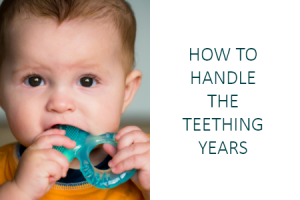How to handle the teething years
 You’re going along in complete baby bliss when suddenly it seems like a monster has taken over your little one. What happened to sleeping through the night? Where did the crying and head throwing come from? Are you suddenly a bad parent? If your child is drooling, cranky and is approaching the 6 month, mark chances are good they are teething.
You’re going along in complete baby bliss when suddenly it seems like a monster has taken over your little one. What happened to sleeping through the night? Where did the crying and head throwing come from? Are you suddenly a bad parent? If your child is drooling, cranky and is approaching the 6 month, mark chances are good they are teething.
The Mayo Clinic says you can suspect teething if your child is:
- Drooling
- Chewing on everything in sight
- Is irritable or crankier than normal
- Has sore and tender gums
- Has a low-grade fever (rectal) of 99 F
Teething — A Developmental Milestone
There are all sorts of things parents celebrate their child doing for the first time. Smiling, cooing, and rolling over— all signs your baby is developing. Teething is another developmental milestone but isn’t exactly celebrated. Because it is painful, your baby might become difficult to console. Teething starts between 6-24 months of age. But, each child is different and so some start teething sooner. You’ll notice the bottom front teeth erupt first, then the top two, then canines, then molars. Children usually finish teething by their 3rd birthday. As a parent this may seem like a long and painful process, and it is, but mainly for your child. Teeth erupting through the gums hurts. Imagine feeling pain, but not understanding why it was happening. Babies and toddlers need a lot of parental support to make it through the teething years. If you are feeling stressed or impatient, reach out to your pediatrician or dentist at Galleria of Smiles for help.
How can I help my child?
Ask five parents and you’ll get five different answers about ‘what works best’ for teething. The best is to experiment until something works for you and your child. A few recommended options from the Mayo Clinic Include:
Massage your child’s sore gums
With a clean finger, apply light pressure to the tender area of the gums. See if you can feel a tooth poking through. The pressure can help ease the pain for a few moments of respite.
Use a cool teething toy
Cold can also provide some relief. Use a cool washcloth or teething toy if your child is experiencing pain. Gnawing on something cool can help. Remember, frozen toys can cause more harm than good.
- Over-the-counter medication
Over the counter acetaminophen or ibuprofen can also relive pain and swelling. Doctors do not recommend homeopathic teething tablets or anything containing benzocaine as it can be extremely harmful.
Taking Care of Baby Teeth
The American Dental Association suggests making your child’s first dental appointment within 6 months of the first tooth breaking through, and no later than the child’s first birthday. Baby teeth are important for the development and health of your child. Clean them and care for them like permanent teeth. Other suggestions for your child’s early oral health include:
- Do not send children to bed with a bottle or sippy cup
- Limit drinks to milk and water
- Eat a healthy balanced diet
- The bacteria that cause cavities is transmissible. Parents should refrain from kissing babies on the mouth and sharing utensils
The teething years can be challenging, but remember it’s temporary. If you take good care of your child’s teeth from the beginning you are setting the stage for a lifetime of good oral health. That’s a parenting win in anyone’s book!
“The content of this blog is not intended to be a substitute for professional medical advice, diagnosis, or treatment. Always seek the advice of qualified health providers with questions you may have regarding medical conditions.”






